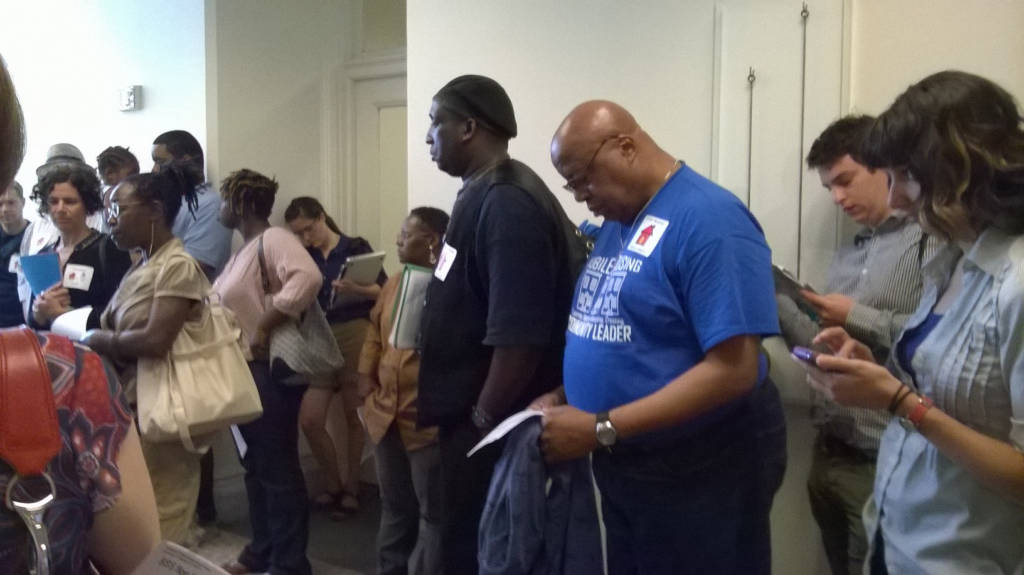A fiscal year 2015 budget that won preliminary approval May 28 from the DC City Council funds initiatives to address homelessness among veterans, families and youth. It provides millions to a major program that aims to build and preserve low-cost apartments.
DC City Council Chairman Phil Mendelson praised the spending plan for “sustaining important investments in affordable housing…” and making “significant investments in the area of human services…”
Yet the budget, which is expected to go to a final vote later this month, has disappointed advocates for the poor during a year when homelessness is on the rise in the city.
“There are some pretty important homeless programs that haven’t been funded sufficiently, particularly given the increase in the COG (Metropolitan Washington Council of Governments) report,” said Kate Coventry, a policy analyst for the DC Fiscal Policy Institute.
The recently released COG study showed a 13 percent increase in homelessness in the city since last year. A total of 7,748 men, women and children were counted here during the annual one-day assessment of homeless people that took place in January, up from 2013. The increase was largely attributed to a rise in homeless families. The count included 1,231 homeless families, a 25 percent increase over 2013.
The city’s FY15 budget includes $7 million to pay for permanent supportive housing (PSH) for homeless veterans and families. It also provides $3 million to help house additional homeless families through the Local Rent Supplement Program (LRSP) as well as funding to hire ten social workers to staff the city’s family shelter at DC General Hospital.
A city initiative to end youth homelessness will receive $1.3 million to pay for 10 transitional beds, five emergency shelter beds and a youth intake center to identify and assist homeless young people.
Yet advocates had hoped for as much as $10 million to combat homelessness among youth. They had also pressed for $2.5 million to help homeless singles, which was not included in the budget approved by the council, Coventry noted.
“We’d like additional funding for LRSP and PSH for families,” she added.
During the weeks leading up to the city council vote, advocates stressed that a loss of affordable housing due to rapid gentrification of many city neighborhoods has contributed to the increase in homelessness in the city.
As approved, the FY 2015 budget includes $79 million for the Housing Production Trust Fund, which is the city’s main tool for creating and preserving affordable housing. But Elizabeth Falcon, campaign organizer for the the Coalition for Nonprofit Housing and Economic Development said affordable housing advocates believe more funding is needed for the program.
“The Mayor committed $100 million last year (for affordable housing) and most of it went to the trust fund,” said Falcon. The money was enough to provide 1,260 affordable units, she said.
“We would like to see the city commit to that baseline of $100 million a year,” said Falcon. “We are aiming for that $100 million still.”
The budget includes $8.9 million for a recreation center to be located at the Alexander Crummell School in the neighborhood of Ivy City, where community activists have been fighting plans for a tour bus depot. They contend the bus facility would contribute pollution and traffic to their neighborhood.
Throughout the budget season, anti-poverty advocates have worked to raise awareness about their priorities with marches and other events.
A May 23 rally brought together members from a wide range of organizations to demand spending to improve the living conditions of DC’s poorest residents.
At that event, held in front of Councilwoman Muriel Bowser’s office at the John A. Wilson Building, the DC Fair Budget Coalition hosted a public panel called “Close the Divide.”
Speakers represented groups including DC for Democracy, Academy of Hope, the People for Fairness Coalition, and the Washington Legal Clinic for the Homeless who stressed the importance of funding to preserve and create affordable housing and combat homelessness.
Bowser, who defeated Mayor Vincent Gray in the Democratic primary and is running for mayor, did not attend, but two of her staff members were present to listen to the concerns and stories of residents from DC’s eight wards. The most vocal speakers were those living at the DC General shelter.
“We all have rights. It’s hard to speak out when all the odds are against you,” said Geraldine Cunningham, a college graduate now living at the city’s family shelter.
When the mayor first unveiled his $10.7 billion FY15 budget in April, he stressed the importance of allocating city funds to address homelessness among veterans and families. He included money to help end homelessness among veterans in the city by 2015 and announced a “500 Families, 100 Days” campaign geared to getting homeless families out of the crumbling DC General shelter and into safe and stable homes. In his budget address, Gray acknowledged deteriorating conditions at DC General and said “I would like to shut it down.”
Still, at the recent budget rally, the prospect of help seemed remote to Cunningham.
“What can you do now?” she asked. “There is a crisis going on right now.”
Activist Robert Warren, a Street Sense vendor who also leads the grassroots People for Fairness Coalition, said he was weary of the annual struggle. I’ve been coming to city hall each budget season for six years now. I’m tired of it. Each year we beg for crumbs. Nothing changes,” he said. “With homelessness up 13 percent since last year, more funding, and more effective use of those funds, is needed to make sure that change is actually headed in the right direction.”








